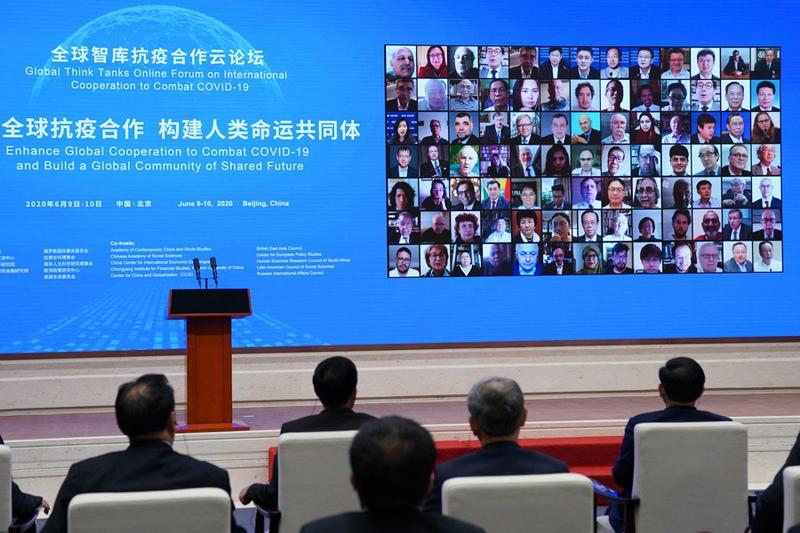 The opening of the Global Think Tanks Online Forum on International Cooperation to Combat COVID-19 via videoconference is held in Beijing June 9, 2020. (FENG YONGBIN / CHINA DAILY)
The opening of the Global Think Tanks Online Forum on International Cooperation to Combat COVID-19 via videoconference is held in Beijing June 9, 2020. (FENG YONGBIN / CHINA DAILY)
Participants in an international online forum that brought together global think tanks have called on the international community to strengthen solidarity and cooperation-the most forceful weapon in overcoming the COVID-19 pandemic, according to a statement they released on Wednesday.
Influential analysts from 48 countries and nine international organizations agreed that deepening information sharing, boosting support for developing nations, ensuring vaccine accessibility worldwide and mitigating economic fallout are among key actions needed to promote an urgently needed global collaboration mechanism, according to the statement.
They also appealed to governments around the world to shoulder the responsibility of protecting their own people and simultaneously contribute to global efforts against the virus.
We believe that strengthening prevention and control and safeguarding people's lives and health are of paramount importance, and that all countries should live up to their responsibilities for their people and promote global cooperation against COVID-19.
Joint statement by influential analysts from 48 countries and nine international organizations
"We believe that strengthening prevention and control and safeguarding people's lives and health are of paramount importance, and that all countries should live up to their responsibilities for their people and promote global cooperation against COVID-19," the joint statement reads.
It was also stressed in the statement that major infectious diseases are the common enemy of humanity, and the lives and health of all people are now closely entwined in an unprecedented way.
ALSO READ: Cooperation and solidarity key to fight pandemic
The participants called for supporting the leadership role of the World Health Organization and intensifying sharing of control policies, treatment methods and scientific research.
The equal right to life and health for all countries, races and social groups should be guaranteed, and more comprehensive supportive resources should be delivered while avoiding discrimination and prejudice, according to the statement.
In response to long-term challenges from the pandemic, such as addressing shortcomings in global governance and reining in global inequality, the statement called for a scientific and rational perspective to tackle issues head on and in united action.
The two-day forum, named "Global Think Tanks Online Forum on International Cooperation to Combat COVID-19", brought together over 160 analysts or representatives from think tanks and media outlets around the world to discuss how to increase global cooperation and build a global community of health for all.
Five Chinese research institutions including the Chinese Academy of Social Sciences and five foreign institutions based in Russia, Argentina, South Africa, Belgium and the United Kingdom, jointly hosted the event.
Following its opening and plenary meeting on Tuesday, four sub-forums on economic recovery, public health governance, balancing control and social and economic development, and challenges in international cooperation, were held on Wednesday.
In the keynote speech on Tuesday night, an official from the State Council Information Office said that facing the unexpected, the Communist Party of China and the Chinese government have made its people and their lives the top priority, and President Xi Jinping has taken personal command and planned the response. He said China has always stood with other countries and fought shoulder to shoulder with them.
READ MORE: Fighting COVID-19: China in Action
Ban Ki-moon, chairman of the Boao Forum for Asia and former secretary-general of the United Nations, said in a message that Xi proposed measures to consolidate global efforts during this year's World Health Assembly in May, which Ban called an admirable act. "Upholding the notion of a community of a shared future and joining hands to fight together is the right tonic," he said.
During the opening, Stjepan Mesic, former president of Croatia, thanked China for providing humanitarian aid to a number of foreign countries and for stepping up donations to the WHO, which will help foster global values in solidarity and cooperation.
Zeng Peiyan, chairman of the China Center for International Economic Exchanges and former vice-premier, urged the reduction of politicization, finger-pointing and Cold War mentality, and called for more science-based discussions, partnerships and united action.
"The issue regarding the origin of the virus must be taken with a rational and fact-based mind. Such scientific questions must not be taken lightly," he said. "It is crucial that we share knowledge and work together to create effective vaccines, as well as coordinate macroeconomic policies and toughen up the global industry chain," he said.
Yasuo Fukuda, the former Japanese prime minister, said some countries are preoccupied with shifting blame and directing criticism, which has deepened distrust and constitutes what he said is the largest obstacle in stimulating global action.
"Short-term compromise can be made in order to achieve a long-term balance of interests, build mutually trustworthy partnerships and promote awareness of interdependence," he said. "This also lies at the core of the notion of a community of a shared future for all mankind."


